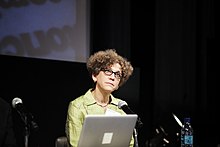Johanna Drucker
| Johanna Drucker | |
|---|---|

Johanna Drucker at HyperStudio's Visual Interpretations Conference @ MIT, May 20, 2010
|
|
| Born |
30 May 1952 Philadelphia, Pennsylvania, U.S. |
| Nationality | American |
| Education | California College of Arts and Crafts, University of California, Berkeley |
| Known for | artists' books, typography, visual poetry, letterpress, digital humanities |
| Notable work | Twenty-six '76, The Word Made Flesh, History of the/my Wor(l)d, Figuring the Word, Against Fiction, Night Crawlers of the Web Narratology, Testament of Women, A Girl's Life, From A to Z |
| Movement | postmodernism |
Johanna Drucker (born May 30, 1952) is an author, book artist, visual theorist, and cultural critic. Her scholarly writing documents and critiques visual language: letterforms, typography, visual poetry, art, and lately, digital aesthetics. She is currently the Martin and Bernard Breslauer Professor in the Department of Information Studies at the Graduate School of Education and Information Studies at UCLA.
Drucker earned her B.F.A. from the California College of Arts and Crafts in 1973 and her Ph.D. from the University of California Berkeley in 1986. She was previously the Robertson Professor of Media Studies at the University of Virginia, and has been on the faculties of Purchase College, SUNY, Yale University, Columbia University, and the University of Texas, Dallas. She has also been the Digital Humanities Fellow at the Stanford Humanities Center, Digital Cultures Fellow at UC Santa Barbara, and Mellon Faculty Fellow in Fine Arts at Harvard University. She is a member of the American Academy of Arts and Sciences.
Drucker's research focuses on alphabet historiography, modeling interpretation for electronic scholarship, digital aesthetics, the history of visual information design, history of the book and print culture, history of information, and critical studies in visual knowledge representation. Most recently, her scholarship has focused on information visualization, "which draws heavily on models from the empirical sciences, where approaches based on representation and transparency prevail." In contrast to this approach, Drucker stresses the rhetorical and performative nature of visualization, with emphasis on interpretation. She contends that digital tools should be used to "design graphic forms that inscribe subjectivity and affective judgment."
...
Wikipedia
